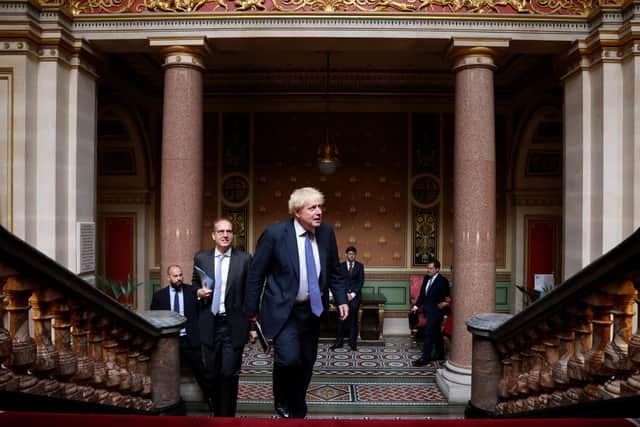Boris Johnson risks Euro court battle in Brexit showdown


Northern Ireland Secretary Brandon Lewis provoked a furious reaction with the admission, including from some Conservative backbenchers, which followed the resignation of the head of the Government Legal Department amid reports he was “very unhappy” with the proposal.
Mr Lewis told MPs legislation to ensure Northern Ireland could continue to enjoy unfettered access to markets in the rest of the UK would breach international law in a “very specific and limited way”. In the House of Commons, former prime minister Theresa May warned the Government was in danger of losing the trust of other countries that it would honour its international agreements while Labour described the admission as “absolutely astonishing”.
Advertisement
Hide AdAdvertisement
Hide AdEuropean Parliament President David Sassoli said any attempts by the UK to undermine the Withdrawal Agreement would have “serious consequences”.


Mr Sassoli said: “On the implementation of the Withdrawal Agreement, trust and credibility are key. We fully expect the UK to honour the commitments that it negotiated and signed up to last year - especially with regard to citizens’ rights and Northern Ireland.” He added: “Pacta sunt servanda (agreements must be kept).
“Any attempts by the UK to undermine the agreement would have serious consequences.”
One expert, Catherine Barnard, a professor of law at Cambridge University, told the BBC: “There is a chance that the EU will decide to trigger the dispute resolution mechanism in the withdrawal agreement, which could lead to arbitration and a case before the European Court of Justice.”
Downing Street has sought to play down the changes in the Internal Market Bill - to be tabled today - insisting they were simply “limited clarifications” to protect the peace process if they failed to secure a free trade deal with the EU.
But pressed by the senior Tory MP Sir Bob Neill on whether they were consistent with the UK’s international legal obligations, Mr Lewis said: “Yes, this does break international law in a very specific and limited way.”
He said that the powers the Government was taking would enable ministers to “dis-apply” the EU legal concept of “direct effect” - which requires the enforcement of EU law - in “certain, very tightly defined circumstances”.
He added: “There are clear precedents for the UK and indeed other countries needing to consider their international obligations as circumstances change.”
Advertisement
Hide AdAdvertisement
Hide AdHowever Sir Bob, who chairs the Commons Justice Committee, said adherence to to rule of law was “not negotiable”.
“Any breach, or potential breach, of the international legal obligations we have entered into is unacceptable, regardless of whether it’s in a ‘specific’ or ‘limited way’,” he tweeted.
Shadow foreign secretary Lisa Nandy said she was “astounded” by the minister’s comments.
“The rule of law keeps us safe, defends our national interest, and allows us to hold others to account. They are diminishing us on the world stage.”
Mrs May said ministers were now seeking to change the operation of an agreement which the Government had signed up to and Parliament had passed into UK law.
“Given that, how can the Government reassure future international partners that the UK can be trusted to abide by the legal obligations of the agreements it signs?” she demanded. The row erupted as the pound plummeted against the US dollar amid fears that Mr Johnson’s chances of securing a post-Brexit free trade deal with the EU were diminishing.
It followed the shock announcement that the head of the Government Legal Department Sir Jonathan Jones had become the latest senior civil servant to quit his post.
No reason was given for his resignation but the Financial Times reported that he was “very unhappy” with the proposed changes to the Withdrawal Agreement.
Advertisement
Hide AdAdvertisement
Hide AdThe news came as the EU’s chief negotiator Michel Barnier was arriving in London for the latest round of the negotiations on a free trade deal.
Ahead of his departure he said he would be seeking assurances from the UK that it was not seeking to backtrack on previous commitments.
In the Commons, Mr Lewis rejected suggestions that Britain would find it more difficult to negotiate trade deals with other countries as a result of its changes to the Withdrawal Agreement.
However there were signs of unease among some Tory MPs that the UK was putting itself in breach of international law.
Sir Roger Gale said the UK was in danger of undermining its international credibility.
“Seeking to renegotiate the Northern Ireland protocol will be regarded worldwide as an act of bad faith,” he tweeted.
“Britain is an honourable country and that honour is not for sale or barter.”
Former minister George Freeman tweeted: “Oh dear. That sound you hear? It’s the sound of the Supreme Court preparing to remind ministers that intentionally breaking the law - even in a very specific and limited way - is, well, unlawful.”
Advertisement
Hide AdAdvertisement
Hide AdVeteran diplomat Lord Kerr of Kinlochard said tearing up international treaties is “what rogue states do”.
Lord Kerr, who served as British ambassador to Washington and Brussels and wrote Article 50 which triggered the formal withdrawal process, was critical of the Government seeking to act unilaterally “with a domestic law purporting to over-ride an international commitment”.
“Tearing up treaties is what rogue states do. I can’t recall our ever doing so,” he said.
Responding, Cabinet Office Minister Lord True argued there were “ambiguities” in the Northern Ireland protocol, intended to ensure there is no return of a hard border with the Republic once the transition is over.
He hoped the issues could be dealt with during the negotiations.
A Scottish Government spokesperson said: “We have warned repeatedly of the needless damage caused by a reckless ‘no deal’ EU exit which Scotland did not vote for – particularly if this comes just weeks after the ending of the furlough scheme.
“As the First Minister made clear again today, if the UK Government does not extend furlough in the way countries like Germany have it will lead to wholly unnecessary redundancies with a devastating impact just as we exit the EU – with all the economic damage that exit will bring, especially if it is ‘no deal’. That would only strengthen the case for Scotland having the full borrowing and other financial powers that come with independence.”
Sir Jonathan’s resignation as head of the UK Government Legal Department was followed by another at the Attorney General’s Office, with Rowena Collins Rice standing down as director general. However, a spokeswoman said the departure was “the result of a process dating back several months”.
Comments
Want to join the conversation? Please or to comment on this article.